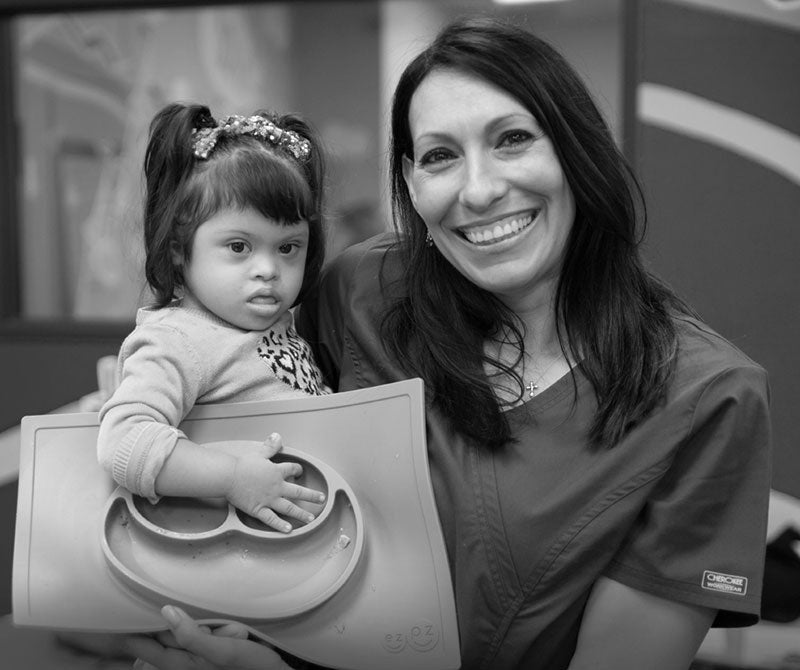How to Avoid BLW Pitfalls (Part 1)
Starting Too Early: As with most feeding therapists, I recommend starting solids at about 6 months of age, depending on the child’s readiness signals. The American Academy of Pediatrics and the World Health Organization also encourage parents to wait until 6 months.But some families are so excited to start baby on solids that they may start too early. Numerous families I see for feeding therapy started their baby on solids at 3-5 months, resulting in choking episodes and baby refusing to eat solid food because they associate eating with choking. To avoid this pitfall, here are some signals that your baby is ready for solid foods:
- Has head control to look up, down and to both sides
- Can sit up on their own
- Starts to drool when watching you eat
- Reaches for your food or drink
- Can support themselves without slumping over
- Stares at you intently while you are eating
- Can grasp objects or food on their own
- Brings their hands to their mouth
- Tongue thrust reflex is gone
Cleaning and Scraping their Face: Feeding aversions can occur if we constantly clean or scrape a child’s face during mealtime. Even a quick wipe or a small scrape from a spoon can be an uncomfortable sensory experience for them. Babies do not like to be distracted by these harsh facial sensations during their eating experience. Thus, cleanup should wait until the end of the meal. To avoid this pitfall, here are some tips to make cleanup more fun for both of you while giving your baby a sign that the meal has ended:
- Use a damp warm washcloth (place in the microwave for 5 seconds)
- Use a damp cold washcloth (place in the freezer for one minute)
- Use a baby face wipe like Neat Cheeks
Being Unaware of Portion Size: In my experience, parents decide to use the BLW feeding method to introduce solid foods AND as an attempt to avoid picky eating. But this can easily backfire if parents are unsure about portion sizes. They may offer too much food and panic when baby does not eat all of it. This can lead to unhealthy feeding routines (like force-feeding) and can quickly turn baby into a finicky eater. Thus, it’s important for parents to know the correct portion sizes for fruits, vegetables, protein and grains for their child’s age group. Knowing the amount of tablespoons your baby currently needs each day (and as they grow) will decrease some of the stress you may feel about starting solids.
When I educate parents about portion sizes, I often remind them that most medical professionals, including pediatricians, recommend breastfeeding for the first year of life. This gives parents a 6-month (+) window to continue to breastfeed or bottle feed, while also introducing solids at the same time. For example, a 6-month-old baby is drinking breast milk or formula as their primary nutrition. You see baby showing all the positive signs of readiness for solid foods and you slowly offer 1-3 tablespoons of food for 1-2 meals a day. Knowing that baby can explore, play and eat a tiny amount can relieve a parent’s anxiety and keep feeding expectations realistic. To avoid the pitfall of inaccurate portion size as your baby grows, check out our book Making Mealtime ezpz for mealtime ideas and more education on serving size.
Not Using a Sectioned Plate: When I ask parents to give me the amount of solid food their baby is eating they are usually unsure of the amount. This is totally normal when you first start solids since most of the food is on baby’s face, under the table and in their food-catching bib. But after a few weeks baby should be swallowing more food safely, and knowing the amount you offer on a plate and the amount they eat becomes key. If parents are using a regular plate, it is difficult for them to measure portion sizes. Having a sectioned plate like the Mini Mat can help you keep track of portion sizes. Each ‘eye’ of the Mini Mat holds 2 ounces (4 tablespoons) and the ‘smile’ holds 4 ounces (8 tablespoons). Remember that some days your baby will eat more and other days a little less. Keep portion size approximations in mind, which will help decrease stress and make introducing solids fun for everyone!
What do you wish you knew before you started your baby on solids? Share some of your BLW feeding pitfalls with us with the hashtags #ezpzfun #blw.
Happy Feeding!
Dawn Winkelmann, M.S, CCC-SLP
SPEECH LANGUAGE PATHOLOGIST & FEEDING SPECIALIST FOR EZPZ
Dawn Winkelmann, a.k.a “Ms. Dawn”, has treated thousands of kids across the globe by helping families overcome picky eating stages and food refusals, while adding new foods into their diet. Her high success rate is attributed to Ms. Dawn bringing her education, experience, sense of humor and her favorite feeding products to the family dinner table.
You will find Ms. Dawn’s expert feeding advice to be positive and fun for the entire family! She adapts complicated feeding/swallowing research and makes it practical and easy for parents! Get ready to learn the science behind your favorite feeding products and ways to bring happy family mealtimes back!



